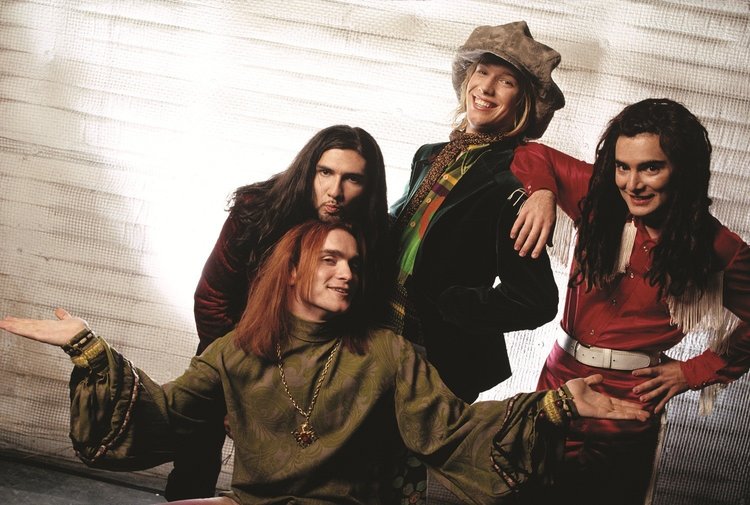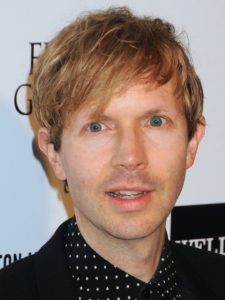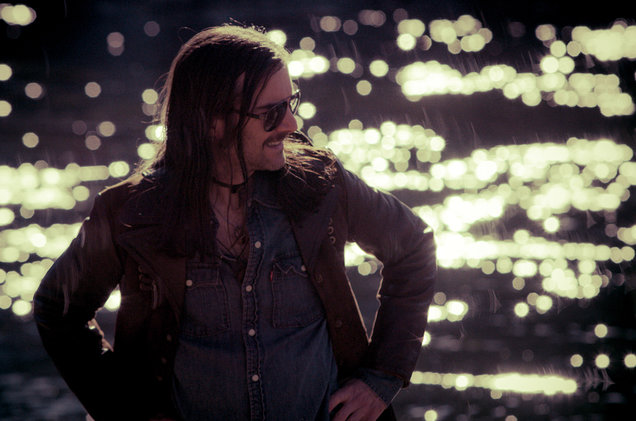Less Is More: A Conversation With Solo Artist and Beck Sideman Roger Joseph Manning Jr.
Roger Joseph Manning Jr. has enjoyed a long and successful career as a professional touring keyboardist, most notably as one of the sidemen for jack-of-all-genres leader, Beck, and his first band, Jellyfish, which he co-founded.
Equally as notable, however, is the 52-year-old Manning’s contributions to literally hundreds of pop/rock albums by the likes of Adele, Eric Clapton, The Killers, Johnny Cash, Roger Waters, Diana Ross, Marilyn Manson, Lana Del Rey, Glen Campbell, Neil Diamond, Blink 182, and Cheap Trick. He has also played on numerous films and TV soundtracks, and has composed music for commercials and radio spots.
Chances are, unless you’ve been living under a rock for the past couple of decades, you’ve heard him, one way or another, and whether you realized it or not.
Manning has continued his brisk pace of late with the release of a brand new EP, “Glamping,” and the same-day release of a deluxe edition of his 2006 album, “Land of Pure Imagination,” which includes three bonus tracks: “What You Don’t Know About The Girl,” “Sleep Children,” and “’Til We Meet Again.”
ListenIowa caught up to Manning recently to discuss “glamping,” what he learned while working in the shadows of legendary producer Rick Rubin, and his love of 60s and 70s music.

What does “glamping” mean to you?
It all started with a photo that was taken at Coachella one summer. I was out there running around with my shirt off, having a good time, and my friends had this beautiful, 1950s camping trailer in their back yard. I was in awe of how beautiful it was, so I had my girlfriend take a picture of me in front of it. When I got the picture back, I was laughing hysterically because I was so rough and tumble and white with my shirt off in front of this camper. (laughs) I thought it would be a great photo to accompany some of the more serious ones that were also outdoors in nature and kind of rugged like a Gordon Lightfoot or John Denver cover. The word “glamping” popped up in my head. My parents raised us “glamping” a lot. We certainly weren’t backpacking with our knapsack out in the wilderness, though. (laughs) I love the word “glam” in there, too. I’ve always loved British glam rock, and it’s been a huge influence and continues to be.
The music on “Glamping” has a distinct 70s radio sound and feel to it. There’s some Queen in “Operator,” and maybe a Cheap Trick leaning in “Funhouse.”
I enjoy writing in all kinds of styles, but when I roll out of bed in the morning, the thing that seems the most natural is that music between 1965 and 1985. The production styles, the arrangement styles, rock was still in its infancy, and the world was exploring its various forms. Hip-hop seems to be what everything is launching out of these days in pop, and people are continuing to push that envelope, but I continue to be a fan of what my childhood influences are. They make me feel the best. I think there’s an audience that enjoys hearing this stuff.
You’ve created some pop music on the album that is similar in feel to what was produced in the 60s and 70s, a sound that could almost be defined as “alternative” at this point due to its scarcity.
I’m smiling to myself here at the absurdity of a sing-along pop song being the anomaly. (laughs) Whereas a hip-hop tune, by virtue of what it is, has no melody; it’s all about the poetry and heavy beat. And that’s fine. But I never would have thought that would be the norm and dominate the top of the bell curve, and the sing-along, Fleetwood Mac/ Burt Bacharach-style melody stuff would be the fringe. In a lot of ways, what I’m doing right now is more “punk rock” than anything that’s been put out in years. As much as I love a good hip-hop groove, I want to dream and sing along and be swept away in a fantasy/psychedelic world. I took that for granted when that was around.
In other words, you enjoy writing and hearing the songs that put smiles on people’s faces more than anything. Or can you go down the dark side of things, too?
I can go both ways, but you’re absolutely right, I’ve always enjoyed the challenge and reward of taking the listener on a journey in the course of three to five minutes, completely pulling them out of their day-to-day environment, and then having them tapping on their steering wheel and singing along. I really try to convey as much emotional conviction and present something very visceral and passionate as soon as possible. That can mean something melancholy and sentimental or joyful and cheerful. My goal is to achieve some kind of immediate and overt feeling, as opposed to something that’s vague.
Why an E.P. at this point?
I have 12 songs in the works, but I realized that between all my freelance work and touring with Beck that if I didn’t narrow it down to an E.P., the public wasn’t ever going to see anything. (laughs) And it reminds my fans that I haven’t disappeared from the planet. I’m glad I did, because it was a real relief to finish these songs. And the good news is that I’ve got another eight songs that are halfway done, so it shouldn’t be too much longer before I can get those out.
Do you see yourself putting out E.P.s here and there at times as opposed to full-length albums?
I don’t see why not; it’s an ongoing experiment. I think it’s a much more practical way to go since my time is so divided with my other musical ventures. It not only keeps it interesting, but it helps me make ends meet as a freelance musician.
Having been a member of Jellyfish, and also in Beck’s band, does your solo work serve as your untapped musical outlet of sorts?
I’ve always enjoyed working with collaborators. I’m the first to admit what my strengths and weaknesses are as a creative musician. Take lyrics for example. It’s not really what I look forward to. I don’t aspire to be a great poet. So when it comes time to writing lyrics to my own material, it’s very laborious and very time consuming. I don’t stop until I get something I’m happy with. I’d be just as happy handing it off to someone who is more passionate about it lyric writing, which is what I’ve gotten to do in the past. I’m always looking for people to collaborate with, but I also have no problem with the solo side of it. And there’s also the aspect of working solo as opposed to with four others where you get into this trap sometimes of every decision has to be a democratic vote. Some people can work that out and get great results. I’ve found that, in my travels, even with the most well meaning people and those you have a lot in common with, at the end of the day, the real purity and essence of the vision gets watered down. You end up with a lot of compromise instead of high art. Solo, there’s no producer. You just do what you want. But on the other side, there’s no one to say, “Wait a minute, you’re going down a rabbit hole that you may not come out of.” (laughs)
You’ve contributed to a lot of artists’ albums over the years as well, including Johnny Cash.
That came through Rick Rubin (producer), who was basically doing what would be Johnny’s last offerings to the world. There were three volumes, and Rick brought me in halfway through that, and I contributed to a variety of things, especially on volumes 2 and 3. Unfortunately, Johnny wasn’t there, however.
Working with Rubin had to be an experience in and amongst itself.
I’ve worked with a lot of producers, and every one of them is a college course in record making. None of them are the same. You’re learning how they interact with people, how they get the results they’re going for, and why they’re going for a particular thing. Sometimes I just sit there in awe because I don’t understand anything that’s happening in their approach until it’s all done. Then I think, “Oh, OK. Now it makes sense.” It’s been a real asset and joy to get to be a part of that as a session musician.

What have you learned from being in the Beck world for 22 years?
One of the things he’s taught me is very simple: restraint. I can remember working with him in the early years, and very often I’d play a song and not know what the keyboard part should be, for instance. I’d try to come up with ideas, and he’d remind me that just because I could play something due to my keyboard training, it didn’t mean that is was necessarily the right answer for the song. For him, restraint was hugely valuable. Sometimes I’d put a part down and everyone else in the room would love it, but Beck would be like, “It’s awesome, but it’s taking up too much space,” or “It’s drawing too much attention to the keyboards. Let’s be a little more subtle and refined about it.”
He’s always seemed to be ahead of the curve musically.
That was super mature, because at that time, he was only in his late 20s. That was really valuable. The other thing is something I’m still wrapping my head around because I’m such a control freak in that he loved recording as soon as the musician started. In my case, he would bring in a new song, and I would learn the chords and get some sounds up on the keyboard and just start kind of fumbling through. He would already be in record mode, though. I can’t tell you how many times I’ve stumbled through a song once or twice, and he’d be like, “OK, we got it.” And I’m like, “Wait a minute. I don’t even have all of the chords learned.” (laughs) He loved initial instinct and the way I related to the vibe. It was a beautiful mess, so to speak, and that essence got captured. We couldn’t see it since we weren’t the writers, but he was able to pull out the instinct from us. And that’s why he has the platinum records on the wall. (laughs)
Where do you go from here?
I’ve been sculpting my career for so long now that I’m really at a place that’s making a lot of sense to me. I like having this variety of things. I’ll continue to do freelance work and continue with Beck as long as he wants to do that. And I’ll continue to write and record original music. I guess my only desire or dream is that more people find out about what me and other folks are doing in this realm. In the current musical climate there’s very little diversity in pop stylings and offerings. There’s kind of one thing that everything looks like; it’s a commodity that is sellable and marketable. I just want to make sure that in the years ahead I reach as many people as possible who want more variety than that.


